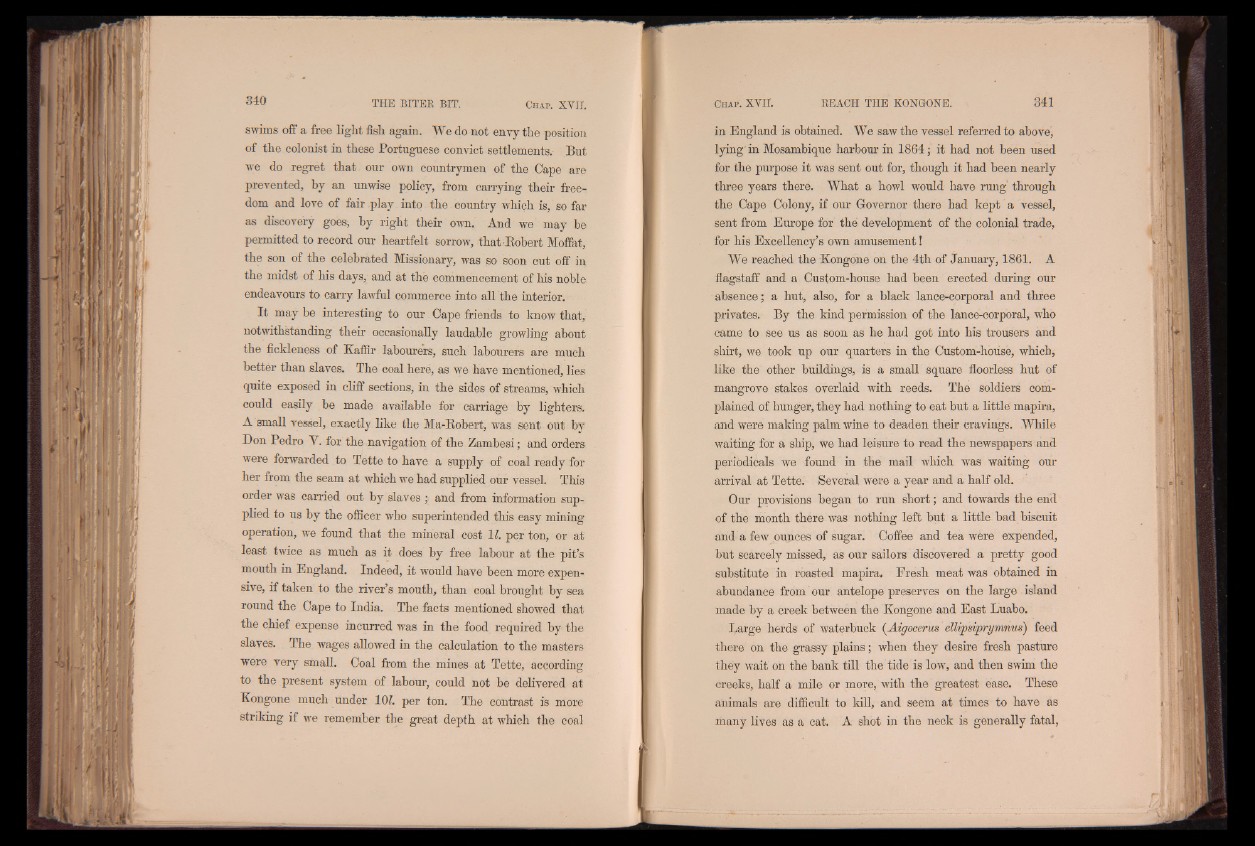
swims off a free light fish again. We do not envy the position
of the colonist in these Portuguese convict settlements.- But
we do regret that our own countrymen of the Cape are
prevented, by an unwise policy, from carrying their freedom
and love of fair play into the country which is, so far
as discovery goes, by right their own. And we may be
permitted to record our heartfelt sorrow, that-Bobert Moffat,
the son of the celebrated Missionary, was so soon cut off in
the midst of his days, and at the commencement of his noble
endeavours to carry lawful commerce into all the interior.
I t may be interesting to our Cape friends to know that,
notwithstanding their occasionally laudable growling about
the fickleness of Kaffir labourers, such labourers are much
better than slaves. The coal here, as we have mentioned, lies
quite exposed in cliff sections, in the sides of streams, which
could easily be made available for carriage by lighters.
A small vessel, exactly like the Ma-Robert, was sent out by
Don Pedro V. for the navigation of the Zambesi; and orders
were forwarded to Tette to have a supply of coal ready for
her from the seam at which we had supplied our vessel. This
order was carried out by slaves ; and from information supplied
to us by the officer who superintended this easy min in g
operation, we found that the mineral cost 11. per ton, or at
least twice as much as it does by free labour at the pit’s
mouth in England. Indeed, it would have been more expensive,
if taken to the river’s mouth, than coal brought by sea
round the Cape to India. The facts mentioned showed that
the chief expense incurred was in the food required by the
slaves. The wages allowed in the calculation to the masters
were very small. Coal from the mines at Tette, according
to the present system of labour, could not be delivered at
Kongone much under 107. per ton. The contrast is more
striking if we remember the great depth at which the coal
in England is obtained. We saw the vessel referred to above,
lying' in Mosambique harbour in 1864 ; it had not been used
for the purpose it was sent out for, though it had been nearly
three years there. What a howl would have rung' through
the Cape Colony, if our Governor there had kept a vessel,
sent from Europe for thé development of the colonial trade,
for his Excellency’s own amusement !
We reached the Kongone on the 4th of January, 1861. A
flagstaff and a Custom-house had been erected during our
absence ; a hut, also, for a black lance-corporal and three
privates. By the kind permission of the lance-corporal, who
came to see us as soon as he had got into his trousers and
shirt, we took up our quarters in the Custom-house, which,
like the other buildings, is a small square floorless hut of
mangrove stakes overlaid with reeds. The soldiers complained
of hunger, they had nothing to eat but a little mapira,
and were making palm wine to deaden their cravings. While
waiting for a ship, we had leisure to read the newspapers and
periodiéals we found in the mail which was waiting our
arrival at Tette. Several were a year and a half old.
Our provisions began to run short ; and towards the end
of the month there was nothing left but a little bad biscuit
and a few ounces of sugar. Coffee and tea were expended,
but scarcely missed, as our sailors discovered a pretty good
substitute in roasted mapira. Fresh meat was obtained in
abundance from our antelope preserves on the large island
made by a creek between the Kongone and East Luabo.
Large herds of waterbuck (Aigocerus ellipsiprymnus) feed
there on the grassy plains ; when they desire fresh pasture
they wait on the bank till the tide is low, and then swim the
creeks, half a mile or more, with the greatest ease. These
animals are difficult to kill, and seem at times to have as
many lives as a cat. A shot in the neck is generally fatal,